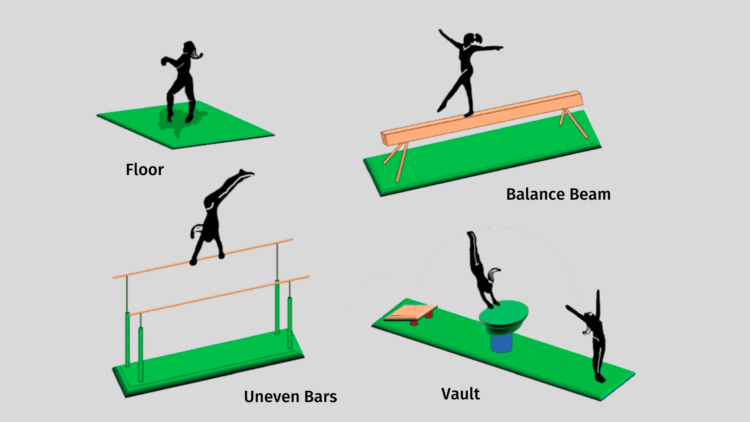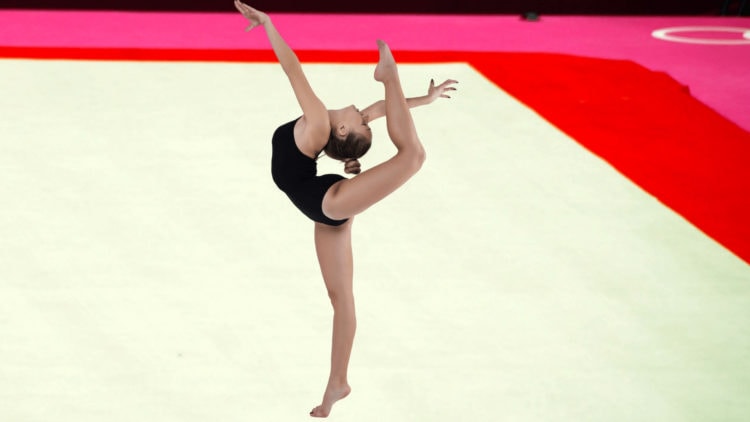
OBJECTIVE OF WOMEN’S GYMNASTICS: Get the best score in all four women’s gymnastics events.
NUMBER OF PLAYERS: 2+ players
MATERIALS: Floor mat, vaulting table, balance beam, uneven bars, leotard, chalk
TYPE OF GAME: Sport
AUDIENCE: 6+
OVERVIEW OF WOMEN’S GYMNASTICS
In women’s gymnastics, athletes perform multiple movements with various equipment. There are four events in women’s gymnastics, each requiring separate skill sets. While the gymnasts must perform in all four events, they will generally favor a particular event.
SETUP

The four events require different setups.
VAULT
The runway for the vault event is around 3 feet wide and 82 feet long. The vault itself sits at the height of 4 feet, and 5 inches. A springboard lies before the vault, allowing the gymnast to launch themselves in the air.
FLOOR
The floor event is performed on a 40×40 feet elastic mat. The floor is also set on top of power springs that reduce the impact when hitting the floor.
UNEVEN BARS
The two bars are parallel to each other but at uneven heights, hence the name. The distance between the two uneven bars can be adjusted depending on the athlete’s height and can range from 4 foot 3 to 5 foot 11.
The lower bar is 5 feet 5 inches from the floor, and the higher bar sits at 8 feet tall.
BALANCE BEAM
The balance beam is 4 inches wide and 16 feet 5 inches long. The beam is about 4 feet from the floor.
GAMEPLAY

Women’s gymnastics can be competed as an individual or team sport. In most competitions, gymnasts will perform all four events. If competing in a team, there are four gymnasts, and each gymnast competes in a single event.
VAULT
Athletes start on the runway and run toward the springboard. The springboard creates momentum for the athlete to jump high enough to put their hands on the vaulting table, also called a horse. The athlete must then land on the other side of the horse. Of course, in gymnastics, there’s more to simply landing on the mat on the other side without falling. To get points, the gymnast must flip around and perform tricks before landing on the mat without falling.
FLOOR
Floor routines last around 70 to 90 seconds and are performed to a song, almost like a dance with tricks. A routine must have each of the following:
- Flip with a 360-degree twist
- Double backflip
- Backward tumbling
- Forward tumbling
- Two hops in a row with at least 1 split
The movements performed in the routine will require the athlete’s flexibility, flexibility, strength, and endurance. The floor routine also requires artistry, and points can be won or deducted for this.
UNEVEN BARS
Athletes rotate and swing back and forth between two crossbars of different heights and widths. An uneven bars routine must include the following:
- Transition from high bar to low bar
- Transition from low bar to high bar
- Releasing and catching the same bar
- 360-degree turn
- Two different grips (the way the athlete holds the bar)
BALANCE BEAM
Athletes perform pre-choreographed movements for 70 to 90 seconds, such as jumps, acrobatics, and spins on a spring-loaded beam. This event requires balance, flexibility, and strength. A balance beam routine must include the following:
- Two dance elements
- One split jump
- One 360-degree turn on one foot
- Acrobatic elements
- Dismount
SCORING
There are two components to scoring gymnastics: difficulty (D) and execution (E). The D and E scores are then added together to determine the total score.
DIFFICULTY
Difficulty points are awarded according to the move performed by the athlete. There is a Code of Points that determines how many points each turn, jump, or other skill is worth (the Code is updated every 4 years). For example, a “handspring double front salto tucked” is worth 6 points, but a “yamashita” is only worth 2 points.
EXECUTION
Execution scores are out of 10, with 10 being the highest possible execution score. Athletes start with 10 points at the beginning of a routine, and deductions are given based on any mistakes from the athlete during the routine. Deductions can range from 0.1 points for leg separation to 1 point for a fall. Deductions can quickly add up, so gymnasts must do their best to perform without any mistakes.
END OF GAME
The athlete or team with the highest score in a particular event or series of events wins the competition!
- 30 GAMES TO PLAY OVER TEXT - April 22, 2024
- 20+ FREE PRINTABLE BABY SHOWER GAMES - April 16, 2024
- 20+ College Party Games for the Best Night Ever! - April 2, 2024